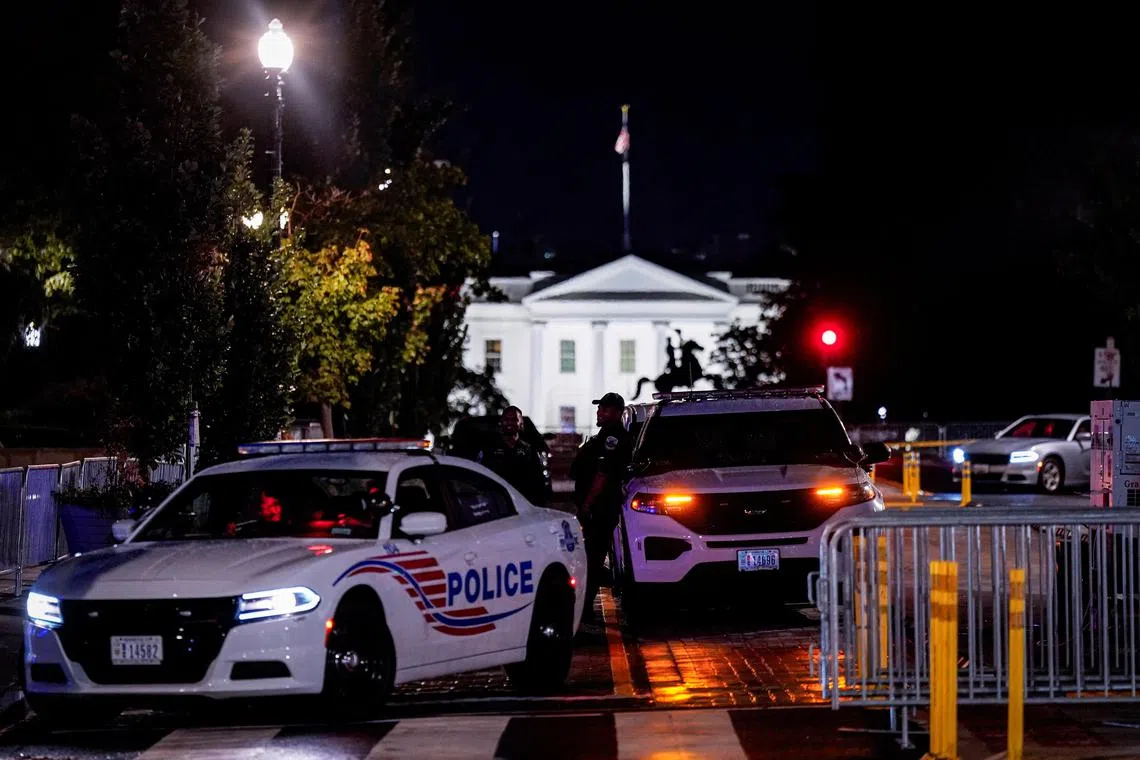Ukraine’s Zelensky accuses Russia of ‘cynical’ strikes ahead of Trump talks
Sign up now: Get ST's newsletters delivered to your inbox

US President Donald Trump will meet Ukrainian leader Volodymyr Zelensky first, and then the leaders of Britain, Germany, France, Italy, Finland, the European Union and Nato, at the White House.
PHOTO: REUTERS
KYIV - President Volodymyr Zelensky accused Russia of unleashing “cynical” attacks on Ukrainian civilians that he said were designed to undermine his talks with US President Donald Trump in Washington on Aug 18.
Officials in Ukraine said a drone attack on a residential complex in the northern city of Kharkiv killed at least seven people, including a one-year-old girl. Strikes also hit the south-eastern city of Zaporizhzhia, killing three people, they said.
“This was a demonstrative and cynical Russian strike,” Mr Zelensky wrote on social media platform X.
“The Russian war machine continues to destroy lives despite everything,” he added. “Putin will commit demonstrative killings to maintain pressure on Ukraine and Europe, as well as to humiliate diplomatic efforts.”
After rolling out the red carpet for Russian President Vladimir Putin in Alaska on Aug 15, Mr Trump is leaning on Ukraine to accept a deal to end Europe’s deadliest war in 80 years, which has killed tens of thousands and displaced millions.
Mr Trump will meet Mr Zelensky first and then the leaders of Britain, Germany, France, Italy, Finland, the European Union and Nato, the White House said. The European leaders are flying to Washington to show solidarity with Ukraine and to press for strong security guarantees in any post-war settlement.
Mr Trump’s team stressed on Aug 17 that there had to be compromises on both sides.
But Mr Trump put the burden on Mr Zelensky to end the war that Russia began with its full-scale invasion in February 2022.
That, along with his comments on Nato and Crimea, annexed by Russia in 2014 during Mr Barack Obama’s presidency, suggested he would press the Ukrainian leader hard at their meeting on Aug 18.
Mr Zelensky “can end the war with Russia almost immediately, if he wants to, or he can continue to fight”, Mr Trump said on Truth Social.
The Ukrainian President, seeking to avoid a repeat of the bad-tempered Oval Office meeting he had with Mr Trump in February, said after arriving in Washington late on Aug 17 he was grateful to the US President for the invitation.
Security guarantees
Ukraine and its allies have taken heart from some developments, including Mr Trump’s apparent willingness to provide post-settlement security guarantees for Ukraine. A German government spokesperson said on Aug 18 that European leaders would seek more details on that in the talks in Washington.
Mr Zelensky has already all but rejected the outline of Mr Putin’s proposals from the Alaska meeting, including for Ukraine to give up the rest of its eastern Donetsk region, of which it currently controls a quarter.
Mr Zelensky is also seeking an immediate ceasefire to conduct deeper peace talks. Mr Trump previously backed that, but reversed course after the summit with Mr Putin and indicated support for Russia’s favoured approach of negotiating a comprehensive deal while fighting rumbles on.
Russia launched missiles and drones in overnight attacks that included strikes on Ukraine’s second-largest city Kharkiv, near the Russian border, which killed seven people, including two children, officials said.
“They hit an ordinary apartment block. Many flats, many families were living here, small children, children’s playground, residential compound. There are no offices here or anything else, we lived here peacefully in our homes,” said Ms Olena Yakusheva, a local resident, as firefighters battled a blaze in the building and rescue workers dug in the rubble.
On the battlefield Russia has been slowly grinding forward, pressing home its advantages in men and firepower. Mr Putin says he is ready to continue fighting until his military objectives are achieved.
Russian peace proposal
The outline of Mr Putin’s proposals, reported by Reuters earlier, appears impossible for Mr Zelensky to accept.
Ukrainian forces are deeply dug into the Donetsk region, whose towns and hills serve as a crucial defensive zone to stymie Russian attacks.
Concerned that they would be shut out of the conversation after a summit with Mr Putin that they were not invited to, European leaders held a call with Mr Zelensky on Aug 17 to align on a common strategy for the meetings with Mr Trump.
“It’s important for the Europeans to be there: (Trump) respects them, he behaves differently in their presence,” Dr Oleksandr Merezhko, a Ukrainian lawmaker from Mr Zelensky’s ruling party, told Reuters.
“D-Day at the White House,” said Britain’s Daily Mail, while the Daily Mirror said “Europe takes a stand” in its front-page headline. Germany’s Die Welt called it the “moment of truth” for the US President.
“It is probably not an exaggeration to say the whole world is looking to Washington,” Germany’s Foreign Minister Johann Wadephul said at a press briefing.
Relations between Kyiv and Washington, once extremely close, have been rocky since Mr Trump returned to the White House in January.
However, Ukraine’s pressing need for US weapons and intelligence sharing, some of which have no viable alternative, has forced Mr Zelenskiy and his allies to work with Mr Trump.
Meanwhile, Russian crude oil flows to Hungary and Slovakia via the Druzhba pipeline were halted on Aug 18. Hungary blamed Ukraine for an attack on a transformer station. Ukrainian Foreign Minister Andrii Sybiha neither confirmed nor denied the account of the attack, but wrote on X that Hungary “can now send complaints” to Moscow, not Kyiv.
Unlike most other EU countries, Hungary has kept up its reliance on Russian energy since Moscow’s invasion of Ukraine. It imports most of its crude via the Druzhba pipeline, which runs through Belarus and Ukraine to Hungary and also Slovakia. REUTERS


